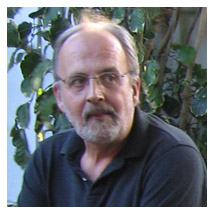Steve Lovelady, who helped launch the Columbia Journalism Review into the digital realm after a stellar career as a serious editor, died of cancer last Friday at sixty-six. He died in Key West, where he had gone with his wife, Ann Kolson, to their vacation home.
Lovelady was a something of a wizard with words and story ideas—“a magician,” as James Naughton, a former Philadelphia Inquirer executive editor, put it in that paper’s obit for Lovelady. He had a knack for making complex themes clear and compelling. His editing was a key factor in the Inquirer’s multiple Pulitzer prizes during Lovelady’s long run there, from 1972 to 1996. Among many other journalists, he worked closely with Donald L. Barlett and James B. Steele, the Inquirer’s storied investigative team.
 He also inspired younger journalists to shine. CJR hired Lovelady at the start of 2004 to run a then-new outlet called Campaign Desk. The idea was to harness the power and speed of the Web to critique and analyze the coverage of that year’s presidential election race as it unfolded. The desk was a success, garnering attention and respect, and is the forerunner of Campaign Desk, the politics and policy desk on CJR.org today.
He also inspired younger journalists to shine. CJR hired Lovelady at the start of 2004 to run a then-new outlet called Campaign Desk. The idea was to harness the power and speed of the Web to critique and analyze the coverage of that year’s presidential election race as it unfolded. The desk was a success, garnering attention and respect, and is the forerunner of Campaign Desk, the politics and policy desk on CJR.org today.
Liz Cox Barrett, who worked here under Lovelady (and who will return to CJR in the spring after a maternity leave), said that “Lovelady embraced the Campaign Desk adventure with equal parts purpose and fun, inspiring the same in his reporters. As an editor, he was colorful and bold and a first-rate storyteller. His palpable enthusiasm for journalism—not to mention, which he rarely did, his accomplishments in the field—made him both an exceptionally effective media critic and a terrific mentor.”
Lovelady gave Paul McLeary, a senior editor at Defense Technology International, what was essentially his first job in journalism. Lovelady “sent me on my first journalistic adventure—to cover the struggles of the Times-Picayune‘s staff in the aftermath of Hurricane Katrina. He handed me his credit card to buy plane tickets and issued my marching orders: ‘Be safe. You’ll do good.’ I think the episode encapsulates his management style at Campaign Desk. He gave us a long leash, but also quietly demanded that we deliver. He changed my life.”
Brian Montopoli, a Campaign Desk veteran now a political reporter at CBSNews.com, said Lovelady “was someone you always could count on to stand by you. And that’s no small thing. He defended his people, and as a young reporter, you felt better putting your work into the world when you knew someone of Steve’s caliber believed in you—and would let everyone know it. He was a great journalist who helped those lucky enough to work with him get a little bit closer to being great journalists.”
“Steve Lovelady was the founding father of CJR’s campaign coverage Web site—a wise, effective, and articulate leader, and it’s a tragedy that his life was cut short,” said Victor Navasky, the chairman of the Columbia Journalism Review.
Nicholas Lemann, dean of the Columbia University Graduate School of Journalism, said that although Lovelady was “the most old-school of newspapermen, [he] instantly understood the immense journalistic potential of the Web, and, more important, knew how to realize it. He transformed Columbia Journalism Review by turning its Web site into a daily online journal of press criticism, with a talented young staff and a significant audience and impact. Watching Steve do this, from a standing start, in less than ninety days was a wonderful experience for me, as was acquiring him as a friend. All of us at the school profoundly mourn his untimely death.”
Lovelady grew up in Worland, Wyoming, and he used to say that, as a defensive end, he likely lined up against former vice president Dick Cheney when his high school team played Cheney’s. He played baseball as well—first base for the University of Missouri.
He graduated from that university’s journalism school, and his career took off at The Wall Street Journal, where he became an editor on the Page One desk, working on the long takeouts that at the time were a centerpiece of the paper’s claim to fame.
When Eugene Roberts Jr. became editor of The Philadelphia Inquirer, the then-twenty-nine-year-old Lovelady was one of his first hires. Lovelady, with many others, helped Roberts build a not-so-great daily in 1972 into a prime example of what a regional metropolitan newspaper could be with serious money, talent, and drive.
After the Inquirer, Lovelady worked as an editor-at-large for Time Inc., and as a freelance editor, for Mother Jones among other outlets, before coming to CJR, which he left in 2006 when CJR funding went through a fallow period.
A memorial service will be held in the spring. Contributions in Lovelady’s name can be sent to Investigative Reporters & Editors, the nonprofit based at the University of Missouri School of Journalism, in Columbia, Missouri.
Mike Hoyt was CJR’s executive editor from 2001 to 2013, teaches at Columbia’s Journalism School and is the editor of The Big Roundtable, a startup that is a home for narrative writing.
